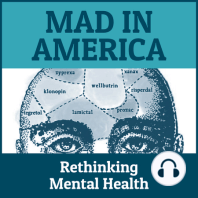35 min listen

John Read and Sue Cunliffe - The 57th Maudsley Debate - This House Believes that ECT has no Place in Modern Medicine
John Read and Sue Cunliffe - The 57th Maudsley Debate - This House Believes that ECT has no Place in Modern Medicine
ratings:
Length:
66 minutes
Released:
Oct 1, 2018
Format:
Podcast episode
Description
This week on MIA Radio we turn our attention to Electroconvulsive Therapy (ECT) or Electroshock as it’s known in the US. On Wednesday, September 19th, this emotive and controversial intervention was discussed at the 57th Maudsley debate, held at Kings College London. The motion proposed was: “This house believes that ECT has no place in modern medicine”. Supporting the motion were Professor John Read who has undertaken several scientific reviews of the literature supporting the use of ECT and Dr Sue Cunliffe. Dr Cunliffe was a paediatrician until she herself underwent ECT, after which she became cognitively impaired and found herself unable to continue working. She now campaigns for the risks of ECT to be made more explicit and to directly address the professional denial of the damage that ECT can cause. Speaking against the motion were Professor Declan McLoughlin and Dr Sameer Jauhar. Both John and Sue took time out to talk about the debate and the wider issues surrounding ECT. Professor Read kindly shared his debate notes, which are provided below. Thank you to the Institute for bringing us all together. Let us first remind ourselves tha thistory is littered with procedures which people believed in- just as strongly as some psychiatrists believe, today, in electrocuting people’s brains to cause seizures - but which turned out to be ineffective or damaging. The list includes spinning chairs, surprise baths, standing people next to cannons, and, more recently, lobotomies. It was 80 years ago, in 1938, that Ugo Cerletti administered the first ECT, to a homeless man in Rome. After the first shock the man called out ‘Not another – it will kill me’. The theory back then was that people with epilepsy didn’t have schizophrenia so the cure for schizophrenia was to cause epilepsy. So Cerletti was driven by the genuine belief that causing convulsions by shocking the brain really might help people, by the genuine hope that we might finally have come up with an effective treatment. The story of ECT illustrates, yet again, however, what happens when our beliefs and good intentions are not tempered with good science. ECT quickly spread from Rome across Europe and America. Finally, an effective treatment! People who received it were discharged earlier….… by the doctors who gave it. But there were no studies for 13 years, by which time everyone just knew it worked, and their belief may have been very helpful to some patients. The first study on depression (which became the main target for ECT), in 1951, found that those who had ECT fared worse than those who had not had it. It made no difference. I have co-authored four reviews of the ECT research, most recently last year. There are only ten depression studies comparing ECT and placebo; placebo meaning the general anaesthetic is given but the electric shock is withheld. Five of those 10 found no difference between the two groups. The other five found, compared to placebo, a temporary lift in mood during the treatment period, among about a third of the patients. One of these five found that this temporary improvement was perceived only by the psychiatrists, but not by the nurses or the patients. Most reviews and meta-analyses assert, on the basis of these temporary gains in a minority of patients, that ‘ECT IS EFFECTIVE’ But none of them have ever identified a single study that found any difference between ECT and placebo after the end of the treatment period. There is just no evidence to support the belief that ECT has lasting benefits, after 80 years of looking for it. Similarly, there are no placebo studies to support another genuinely held belief: that ECT prevents suicide. There is nothing wrong with treatments working because of hopes and expectations. But passing 150 volts through brain cells designed for a tiny fraction of one volt causes brain damage. Indeed, autopsies quickly led to a new theory about how ECT works. In a 1941 article entitled ‘Brain damaging therapeutics’, the man w
Released:
Oct 1, 2018
Format:
Podcast episode
Titles in the series (100)
Jay Joseph - Why Schizophrenia Genetic Research is Running on Empty: Mad in America: science, psychiatry and social justice by Mad in America: Rethinking Mental Health